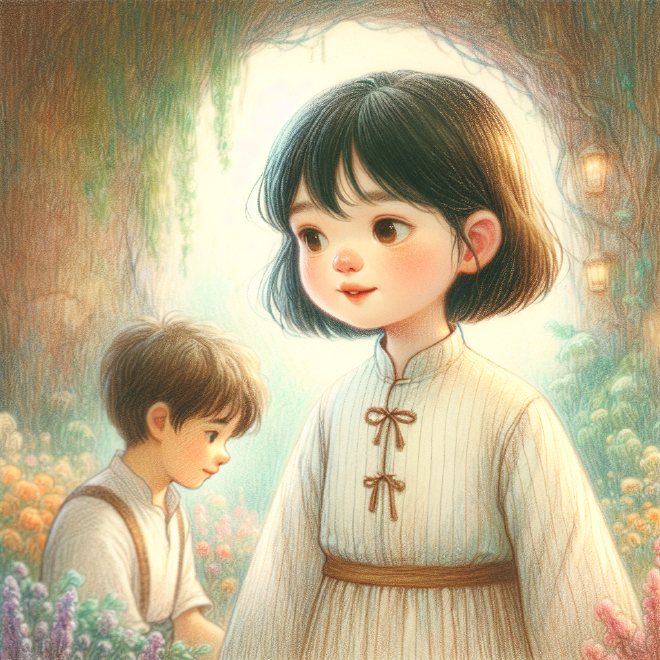镜中花

Table of Contents
Audio #
汉字 #
丽丽很喜欢跳舞。学校要举行表演,她想参加,可是老师说名额满了。一天,丽丽看到小明在教室偷偷练习跳舞。小明跳的是一个很难的中国传统舞蹈,动作很漂亮。
丽丽有点儿生气,觉得小明为什么不告诉她。她也想跳舞啊!但是,丽丽看到小明跳舞的时候很认真,也很努力。她知道小明一定练习了很久。
丽丽走到小明面前,问:“你在练习什么舞蹈?我可以看看吗?”
小明有点不好意思,说:“这是一个中国传统舞蹈,学校表演的时候我要跳。”
丽丽说:“我可以跟你一起学习吗?我也很喜欢跳舞,我可以帮你。”
小明很高兴,说:“真的吗?太好了!一起练习吧!”
从那以后,丽丽和小明每天一起练习跳舞。丽丽开始觉得,帮助别人,也很开心。最后,虽然丽丽没有参加学校的表演,但是她学会了一个新的舞蹈,而且和小明成了好朋友。
Pinyin #
Lìlì hěn xǐhuan tiàowǔ. Xuéxiào yào jǔxíng biǎoyǎn, tā xiǎng cānjiā, kěshì lǎoshī shuō míng’é mǎn le. Yì tiān, Lìlì kàndào Xiǎomíng zài jiàoshì tōutōu liànxí tiàowǔ. Xiǎomíng tiào de shì yí ge hěn nán de Zhōngguó chuántǒng wǔdǎo, dòngzuò hěn piàoliang.
Lìlì yǒudiǎnr shēngqì, juéde Xiǎomíng wèishénme bù gàosù tā. Tā yě xiǎng tiàowǔ a! Dànshì, Lìlì kàndào Xiǎomíng tiàowǔ de shíhou hěn rènzhēn, yě hěn nǔlì. Tā zhīdào Xiǎomíng yídìng liànxí le hěn jiǔ.
Lìlì zǒudào Xiǎomíng miànqián, wèn: “Nǐ zài liànxí shénme wǔdǎo? Wǒ kěyǐ kànkan ma?”
Xiǎomíng yǒudiǎn bù hǎoyìsi, shuō: “Zhè shì yí ge Zhōngguó chuántǒng wǔdǎo, xuéxiào biǎoyǎn de shíhou wǒ yào tiào.”
Lìlì shuō: “Wǒ kěyǐ gēn nǐ yìqǐ xuéxí ma? Wǒ yě hěn xǐhuan tiàowǔ, wǒ kěyǐ bāng nǐ.”
Xiǎomíng hěn gāoxìng, shuō: “Zhēn de ma? Tài hǎo le! Yìqǐ liànxí ba!”
Cóng nà yǐhòu, Lìlì hé Xiǎomíng měi tiān yìqǐ liànxí tiàowǔ. Lìlì kāishǐ juéde, bāngzhù biéren, yě hěn kāixīn. Zuìhòu, suīrán Lìlì méiyǒu cānjiā xuéxiào de biǎoyǎn, dànshì tā xuéhuì le yí ge xīn de wǔdǎo, érqiě hé Xiǎomíng chéng le hǎo péngyou.
English Translation #
Lili really likes to dance. The school was going to hold a performance, and she wanted to participate, but the teacher said the spots were full. One day, Lili saw Xiaoming secretly practicing dancing in the classroom. Xiaoming was dancing a difficult traditional Chinese dance, and the movements were very beautiful.
Lili was a little angry, feeling why Xiaoming didn’t tell her. She also wanted to dance! But, Lili saw that Xiaoming was very serious and worked very hard when he danced. She knew that Xiaoming must have practiced for a long time.
Lili walked up to Xiaoming and asked, “What dance are you practicing? Can I take a look?”
Xiaoming was a little embarrassed and said, “This is a traditional Chinese dance, and I’m going to dance it at the school performance.”
Lili said, “Can I learn with you? I also really like to dance, and I can help you.”
Xiaoming was very happy and said, “Really? That’s great! Let’s practice together!”
From then on, Lili and Xiaoming practiced dancing together every day. Lili began to feel that helping others was also very happy. In the end, although Lili didn’t participate in the school performance, she learned a new dance, and became good friends with Xiaoming.
Grammatical Points and Analysis #
Verb-Object Phrases: #
- 跳舞 (tiàowǔ): to dance
- 练习跳舞 (liànxí tiàowǔ): to practice dancing
- 帮助别人 (bāngzhù biéren): to help others
- 举行表演 (jǔxíng biǎoyǎn): to hold a performance
- 学习舞蹈 (xuéxí wǔdǎo): to learn dancing
Resultative Complements: #
- 看到 (kàndào): to see (kan + dao. dao shows the result of ‘kan’ which is able to see it)
- 学会 (xuéhuì): to learn (xue + hui. hui shows the result of ‘xue’ which is learn and be able to do it.)
- 觉得 (juéde): to feel (jue + de. De means ’to obtain’. Feel/Think you have obtained)
Adjective + 的 + Noun structure: #
- 难的中国传统舞蹈 (nán de Zhōngguó chuántǒng wǔdǎo): difficult traditional Chinese dance
- 新的舞蹈 (xīn de wǔdǎo): new dance
Use of 虽然…但是… (suīrán…dànshì…) structure: #
- 虽然丽丽没有参加学校的表演,但是她学会了一个新的舞蹈 (Suīrán Lìlì méiyǒu cānjiā xuéxiào de biǎoyǎn, dànshì tā xuéhuì le yí ge xīn de wǔdǎo): Although Lili didn’t participate in the school performance, she learned a new dance.
Questions #
- 为什么 (wèishénme) 丽丽 (Lìlì) 开始 (kāishǐ) 的时候 (de shíhou) 有点儿 (yǒudiǎnr) 生气 (shēngqì)? (Why was Lili a little angry at first?)
Click to show the answer
Answer #
因为 (yīnwèi) 她 (tā) 也 (yě) 想 (xiǎng) 参加 (cānjiā) 表演 (biǎoyǎn), 但是 (dànshì) 老师 (lǎoshī) 说 (shuō) 名额 (míng’é) 满 (mǎn) 了 (le), 而且 (érqiě) 小明 (Xiǎomíng) 没有 (méiyǒu) 告诉 (gàosù) 她 (tā) 关于 (guānyú) 跳舞 (tiàowǔ) 的 (de) 事 (shì). (Because she also wanted to participate in the performance, but the teacher said the spots were full, and Xiaoming didn’t tell her about the dancing.)
- 最后 (zuìhòu), 丽丽 (Lìlì) 有 (yǒu) 参加 (cānjiā) 学校 (xuéxiào) 的 (de) 表演 (biǎoyǎn) 吗 (ma)? 她 (tā) 得到了 (dédào le) 什么 (shénme)? (In the end, did Lili participate in the school performance? What did she gain?)
Click to show the answer
Answer #
丽丽 (Lìlì) 没有 (méiyǒu) 参加 (cānjiā) 学校 (xuéxiào) 的 (de) 表演 (biǎoyǎn)。她 (tā) 学会 (xuéhuì) 了 (le) 一个 (yí ge) 新 (xīn) 的 (de) 舞蹈 (wǔdǎo), 而且 (érqiě) 和 (hé) 小明 (Xiǎomíng) 成了 (chéng le) 好 (hǎo) 朋友 (péngyou)。(Lili did not participate in the school performance. She learned a new dance and became good friends with Xiaoming.)
Disclaimer: This story is purely fictional and generated by AI. Any similarities to real people, places, or events are purely coincidental.